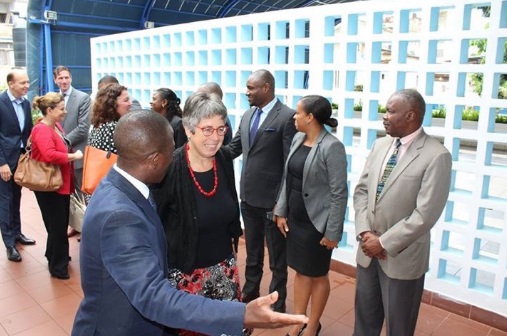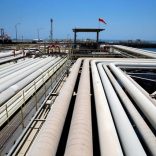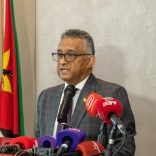Mozambique, Brazil and Portugal in the spotlight at 'Maillot à Table!' Paris Global Gastronomy ...
Holland disburses US$14.5 million to improve water supply in Mozambique

Twitter / The Netherlands' Deputy Director General for International Cooperation Reina Buijsvisits Water Supply Assets and Investment Fund (FIPAG), accompanied by its mannaging director Pedro Paulino
The Dutch and Mozambican authorities on Tuesday signed two agreements to improve water supply, under which Holland will provide funding of 13.5 million euros (about US$14.5 million).
Signing the agreements were the general director of the Mozambican government’s Water Supply Assets and Investment Fund (FIPAG), Pedro Paulino, and the Dutch Deputy Director-General for Development Cooperation, Reina Buijs.
The first agreement concerns expansion of the water supply service though drawing up studies and identifying new sources of impoundment of water; improvement of operational efficiency; consolidation of asset management; development of human resources; involvement of the private sector; and identifying and implementing new development strategies.
This agreement will absorb 12.5 million euros. The other million euros will be spent on the second agreement, financing a “Develop to Build” project in the central cities of Beira and Dondo.
This agreement envisages drafting a master plan and executive project to ensure appropriate conditions for rehabilitating and expanding the Beira water system.
“The purpose of this agreement is to structure better the water supply challenges in Beira and Dondo, envisaging the infrastructures necessary to meet, by 2030, the targets in the sustainable Development Goals”, said Paulino.
Paulino expected these agreements to improve the level of service provided to clients, to boost the efficiency of the water supply network, and to reduce losses. He said that, on average, Mozambican water supply systems lose 40 per cent of their water every year. Among the reasons for this, he explained, was the antiquated state of much of the piping and other infrastructure.
For her part, Buijs said the agreements are essentially intended to build up FIPAG’s capacity in various areas.
It was not enough to invest in water supply facilities, she said. It was also important to recover costs and to maintain the water systems.
“We are building a partnership which can support the country in its investments”, Buijs added. “It is important to supply the people with water and to be certain that the infrastructures are sustainable. That why we are investing in building the capacity of FIPAG. We are doing this in the certainty that, in the end, Mozambique will be able to distribute safe drinking water and make the investments sustainable”.













Leave a Reply
Be the First to Comment!
You must be logged in to post a comment.
You must be logged in to post a comment.